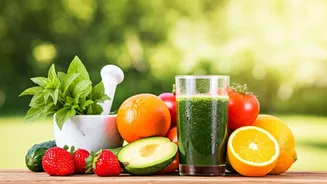Embrace the Detox
The excitement of Diwali often involves rich foods and celebratory drinks. Post-celebration, your body might feel sluggish. Detoxing, in this context,
does not necessitate intense cleanses but focuses on supporting your body’s natural processes. Prioritizing rest, hydration, and mindful eating are key steps towards feeling refreshed. Gentle methods can aid your body in efficiently processing the excesses of the festivities and restoring your energy levels. Integrating simple practices into your routine helps you reset and re-energize after the celebrations, ensuring you enjoy the aftermath as much as the festivities.
Hydration is Key
Rehydrating is among the most important aspects after the Diwali celebrations. Alcohol and rich foods can cause dehydration, affecting energy and overall well-being. Drinking plenty of water helps flush out toxins and supports bodily functions. Consider incorporating hydrating foods like fruits and vegetables, which also offer essential nutrients. Aim for at least eight glasses of water daily and be mindful of your body’s needs. Proper hydration contributes significantly to feeling revitalized, helps improve digestion, and enhances your body’s natural detoxification pathways. Staying hydrated is an accessible and vital part of post-Diwali recovery.
Herbal Remedies
Herbal remedies provide an effective way to support your body's recovery after Diwali. Certain herbs are known for their detoxifying properties, aiding in liver function and digestion. Some examples of helpful herbs include ginger, which aids digestion; turmeric, known for its anti-inflammatory effects; and tulsi, known for its immunity-boosting properties. Incorporating these herbs into teas or meals can offer significant benefits. These natural options gently support your body’s natural detoxification and recovery processes. Consulting with a healthcare expert can help you tailor herbal remedies specifically to your needs.
Mindful Eating
After indulging in Diwali feasts, adopting mindful eating practices is valuable. This involves paying attention to your body’s hunger and fullness cues, and choosing nutrient-rich foods. Focus on easily digestible meals, such as soups, salads, and steamed vegetables. Gradually reintroduce heavier foods to avoid overwhelming your digestive system. Eating slowly, savoring each bite, and avoiding overeating will greatly benefit your digestion. Practicing mindful eating encourages a healthier relationship with food, assisting your body in recovering from rich, festive meals and promotes overall well-being. The emphasis is on nourishing your body with balance and care.
Gentle Exercises
Light exercises are very beneficial for aiding recovery after the festive season. Engaging in gentle physical activities helps boost circulation, aiding in detoxification and energy. Walking, yoga, and light stretching can improve your mood and well-being. Avoiding intense workouts immediately after Diwali is suggested, instead focusing on low-impact activities to gently energize your body. Regular exercise enhances your body’s ability to detoxify naturally, promoting overall health. The goal is to gradually reintroduce movement into your routine, and to ease back into your regular fitness activities, all contributing to an improved feeling of revitalization.
Prioritize Rest
Ensuring adequate rest is vital to the recovery process. Celebrations often disrupt sleep patterns. Allow your body time to recover by getting enough sleep. Aim for 7-8 hours of sleep per night to allow the body to repair and rejuvenate. Creating a relaxing bedtime routine, such as reading or taking a warm bath, can improve sleep quality. A well-rested body is better equipped to handle post-Diwali recovery, supporting mental and physical health. Prioritizing rest helps to restore energy, allowing you to return to your normal routine feeling refreshed and revitalized. This practice is as important as the remedies themselves.













